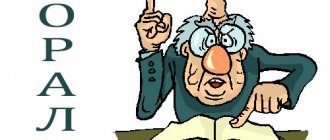Morality is a conditional concept of rules, principles, assessments, norms based on the paradigm of assessments of evil and good, which was formed in a certain period of time. This is a model of social consciousness, a method of regulating the behavior of a subject in society. It develops both in individual and social forms of subjective relations.
The concept of morality from the point of view considered by psychologists is a fragment of the human psyche, formed at a deep level, responsible for assessing events occurring in various planes with the meaning of good and bad. The word morality is often used as a synonym for the word morality.
Morality in the Encyclopedic Dictionary:
Morality - (from Latin moralis - moral) -1) morality, a special form of social consciousness and a type of social relations (moral relations). One of the main ways of regulating human actions in society with the help of norms. In contrast to simple custom or tradition, moral norms receive ideological justification in the form of the ideals of good and evil, due, justice, etc. Unlike law, the fulfillment of moral requirements is sanctioned only by forms of spiritual influence (public assessment, approval or condemnation). Along with universal human elements, morality includes historically transitory norms, principles, and ideals. Morality is studied by a special philosophical discipline - ethics. 2) Separate practical moral instruction, moral teaching (moral of a fable, etc.).
How to relax mentally?
First of all, it is worth keeping in mind that mental stress is inseparable from physical stress. You have probably noticed that after conflict and difficult mental situations, muscles tense and different parts of the body hurt. The body is the seat of the soul, so moral relaxation includes physical relaxation.
The main way to relax and get rid of tensions at all levels is meditation. It allows you to stop wasting energy on trifles - constantly thinking about situations that cannot be solved immediately, as well as maintaining unnecessary tension.
The meaning of the word Moral according to Ushakov’s dictionary:
MORAL morality, plural. no, w. (from Latin moralis - moral). 1. Moral teaching, a set of rules of morality and ethics (book). It is necessary that the whole task of upbringing, educating and teaching modern youth should be the inculcation of communist morality in them. Lenin. Bourgeois morality. Principles of morality. ? Morality, behavior from the point of view of moral rules. A person of low morals. 2. a moral conclusion from something, a moral lesson. The moral of this story is this. Krylov. Hence the moral: no mercy to the enemy! Capital morality (see capital).
How was the concept of morality formed?
It is impossible to say for sure when people first thought about what morality was. The most ancient source describing this concept is the parables of Solomon (mid-10th century BC). Confucius (VI-V centuries BC) wrote a lot about issues of morality and ethics, who considered mercy, philanthropy and integrity to be the most important universal values. He claimed that he did not create a new teaching, but collected together the knowledge received from the ancient sages.
The modern word “morality” comes from the Latin word mores (traditions, mores). It was used by ancient Roman authors to show the conformity of a certain act with good morals. Also, ancient Greek authors discussed a lot about the concepts of conscience, honor and virtue, starting from the 8th century BC. It is interesting that the word “morality” came into the Russian language through French (la morale) in the 18th century.
Cicero made a great contribution to the formation of the concept of morality. The thinker talked a lot about how ethics, morality and law relate to each other. He sought to show that it is impossible to separate the concepts of law and morality, since together they make it possible to rid society of chaos and create order. Of course, Cicero, who lived in the 1st century BC, was far from a pioneer on this topic. But it was he who introduced the definition of morality , which we still rely on today.
Morality is not just a philosophical concept. It traditionally serves as the basis for many religions. Key principles of morality are found in the teachings of Moses, Jesus, Muhammad and Buddha. Since the level of education in those days was different, many moral norms were incomprehensible and not obvious to ordinary people. But believing that “God wants it this way,” they accepted and observed these norms.
Definition of the word “Morality” according to TSB:
Morality (lat. moralis - moral, from mos, plural mores - customs, mores, behavior) morality, one of the main ways of normative regulation of human actions in society. a special form of social consciousness and type of social relations (moral relations). subject of special study of ethics. The content and nature of people's activities in society are ultimately determined by the objective socio-historical conditions of their existence and the laws of social development (see Historical materialism). But the methods of direct determination of human actions, in which these conditions and laws are refracted, can be very different. One of these methods is normative regulation, in which the needs of people living together in society and the need to coordinate their mass actions are fixed in general rules (norms) of behavior, regulations and assessments. M. belongs to the main types of normative regulation, such as law, customs, traditions, etc., intersects with them and at the same time differs significantly from them. M. stands out from the initially undifferentiated normative regulation into a special sphere of relations already in tribal society; it goes through a long history of formation and development in pre-class and class society, where its requirements, principles, ideals and assessments acquire a largely class character and meaning, although along with This also preserves universal human moral norms associated with the conditions of human life common to all eras. M. reaches its highest development in socialist and communist society, where it becomes united within the framework of this society and subsequently becomes a completely universal morality. M regulates human behavior and consciousness to one degree or another in all spheres of social life without exception—in work, in everyday life, in politics and science, in family, personal, intra-group, inter-class, and international relations. In contrast to the special requirements imposed on a person in each of these areas, the principles of mathematics have socially universal significance and apply to all people, capturing in themselves that common and fundamental thing that makes up the culture of interhuman relationships and is deposited in the centuries-old experience of the development of society. They support and sanction certain social foundations, a structure of life and forms of communication (or, on the contrary, require their change) in the most general form, in contrast to more detailed, traditionally customary, ritual etiquette, organizational, administrative and technical norms. Due to the generality of moral principles, morality reflects the deeper layers of the socio-historical conditions of human existence and expresses his essential needs. If in law and organizational regulations regulations are formulated, approved and implemented by special institutions, then the requirements of morality (as well as custom) are formed in the very practice of mass behavior, in the process of mutual communication of people and are a reflection of life-practical and historical experience directly in collective and individual ideas, feelings and will. Moral norms are implemented practically and reproduced on a daily basis by the force of mass habits, dictates and assessments of public opinion, beliefs and motivations cultivated in the individual. Fulfillment of M.'s requirements can be controlled by all people without exception and by each individual. The authority of a person in morality is not associated with any official authority, real power, or social position, but is spiritual authority, that is, conditioned by his moral qualities (the power of example) and the ability to adequately express the meaning of the moral requirement in that or otherwise. In general, in M. there is no separation of subject and object of regulation characteristic of institutional norms. In contrast to simple customs, the norms of M. are not only supported by the force of an established and generally accepted order, the power of habit and the cumulative pressure of others and their opinions on the individual, but receive ideological expression and justification in general fixed ideas (commandments, principles) about how should do. The latter, reflected in public opinion, at the same time represent something more stable, historically stable and systematic. M. reflects a holistic system of views on social life, containing one or another understanding of the essence (“purpose,” “meaning,” “goal”) of society, history, man and his existence. Therefore, the prevailing morals and customs at a given moment can be assessed by morality from the point of view of its general principles, ideals, criteria of good and evil, and moral views can be critical of the actually accepted way of life (which is expressed in the views of the progressive class or , on the contrary, conservative social groups). In general, in M., unlike custom, what should and what is actually accepted do not always and not completely coincide. In a class antagonistic society, the norms of universal morality were never fulfilled entirely, unconditionally, in all cases without exception. Demands for their full and consistent implementation (for example, the inviolability of human life, honesty, respect for the rights of others, humanity) were usually supported by those who experienced the burden of oppression, social injustice, or sympathized with the situation of the exploited and unequal sections of society. The moral-critical attitude towards the ruling system developed on this basis is one of the important aspects of the oppositional and then revolutionary consciousness of the working classes. The role of consciousness in the sphere of moral regulation is also expressed in the fact that moral sanction (approval or condemnation of actions) has an ideal-spiritual character. it does not appear in the form of effective and material measures of social retribution (rewards or punishments), but an assessment that a person must himself realize, accept internally and accordingly direct his actions in the future. In this case, what matters is not just the fact of someone’s emotional-volitional reaction (indignation or praise), but the compliance of the assessment with general principles, norms and concepts of good and evil. For the same reason, individual consciousness (personal beliefs, motives, and self-esteem) plays a huge role in mathematics, which allows a person to control, internally motivate his actions, independently justify them, and develop his own line of behavior within a team or group. In this sense, K. Marx said that “...morality is based on the autonomy of the human spirit...” (K. Marx and F. Engels, Works, 2nd ed., vol. 1, p. 13). In M., not only the practical actions of people are assessed, but also their motives, motivations and intentions. In this regard, in moral regulation, personal education takes on a special role, that is, the formation in each individual of the ability to relatively independently determine and direct his own line of behavior in society and without everyday external control (hence such concepts of morality as conscience, a sense of personal dignity and honor). Moral requirements for a person do not mean achieving some particular and immediate results in a certain situation, but following general norms and principles of behavior. In a particular case, the practical result of an action may be different, depending on random circumstances. on a general social scale, in the aggregate, the fulfillment of a moral norm meets one or another social need, reflected in a generalized form by this norm. Therefore, the form of expression of a moral norm is not a rule of external expediency (in order to achieve such and such a result, one must act in such and such a way), but an imperative requirement, an obligation that a person must follow when implementing his various goals. Moral norms reflect the needs of man and society not within the boundaries of certain particular circumstances and situations, but on the basis of the vast historical experience of many generations. Therefore, from the point of view of these norms, both the special goals pursued by people and the means of achieving them can be assessed. Morality has several basic historical forms, corresponding to the main social formations. Pre-class mathematics is characterized by relative simplicity, incomplete abstraction from archaic customs, underdevelopment of general principles, and is associated with the not yet completely independent position of the individual in a communal-tribal society. “The tribe remained a border for a person both in relation to a foreigner and in relation to himself... People of this era... have not yet broken away... from the umbilical cord of the primitive community” (Engels F., ibid., vol. 21, p. 99). The equality of individuals is assumed by itself, but that is why it does not yet act as a special requirement for respect for the equal rights of each individual. The requirement of justice applied to all members of the collective and provided for various rights and responsibilities of the individual to the generic whole. During this period, the simplest moral requirements for a person as a member of the clan, producer and warrior were formed (respect for the customs of the clan, endurance, courage, veneration of elders, a sense of equality in the division of spoils), while many forms of personal relationships in marriage, family and other spheres were regulated mainly in other ways (customs, rituals and ceremonies, religious and mythical ideas). In pre-class and early-class society, for the first time, the incomplete correspondence and even the opposition of the requirements of M. to the generally accepted practice of ordinary behavior is realized. The coming era of social inequality, private property interests and competition of individuals, class oppression and the unequal position of workers contributes to the formation in the broad masses of consciousness of the injustice of the existing order, the degradation of morals in comparison with the past, “... which directly appears to us as a decline, a fall in comparison with a high moral level, old tribal society" (ibid.). These motives of moral condemnation of the vices of existing society and the desire for the full implementation of the basic demands of morality run like a red thread through the entire history of the class struggle and are one of the sides in the formation of revolutionary morality of the oppressed classes, each time taking a special form. Each of the dominant moral systems also has its own characteristics. In ancient society, productive labor did not appear as a task worthy of a free person. The slave was usually excluded from the sphere of action of M. and was considered, on the one hand, a being to whom no demands of virtue could be made, and on the other, an object of relationship that did not fall under the criteria of morality. In feudal society, on the contrary, labor appears as a duty of a person (serf, free peasant or artisan), simultaneously receiving religious sanction. In the knightly-feudal class, only military valor and a sense of noble honor were considered virtues. In European-feudal society, Christian morality, the most general synthesis and sanction of this system, according to Engels’s characterization (see ibid., vol. 7, p. 361), placed special emphasis on humility, taming the flesh and “pride” as opposed to the cult of reason , will or human sensuality in antiquity. The early Christian commandment of “love for one’s neighbor” in the Middle Ages of the early and middle periods almost did not affect ordinary human relations (the mass consciousness of the knightly and peasant classes largely remains pagan). in the later Middle Ages, this commandment acquired an abstract religious meaning of serving people (mercy, compassion) as “sons of God,” which did not concern the essence of the prevailing relations between classes. The strengthening of the existing order is served by the distinction characteristic of feudalism between the responsibilities and virtues of the privileged and oppressed sections of the population. The emerging bourgeois capitalism came out with recognition of the equality of all people (see F. Engels, ibid., vol. 20, pp. 106-07), but only as “equality of opportunity” for individuals as potential free entrepreneurs. In essence, this meant equality only for private owners. In the fight against feudal-Christian M., bourgeois M. initially acted under the sign of “reasonable egoism” and “mutual use,” that is, it was based on the illusion that any person, achieving only his own “reasonable” goals, thereby contributes to the good others and society as a whole. In the classical bourgeois view, money was generally reduced to a way for an individual to achieve success and happiness in life. This is especially characteristic of the era of primitive accumulation, where the principle of virtue was the asceticism of diligence and hoarding and the postponement of pleasures and rewards for the future. Subsequently, this principle of abstinence was preached to the working class as a way to achieve well-being in life. However, for the worker, according to F. Engels, “...honesty, hard work, frugality and all other virtues recommended to him by the wise bourgeoisie...” are not at all a guarantee that they “... will really lead him to happiness” (ibid., t 2, p. 265). Within the framework of bourgeois morality, certain universal moral norms, of course, find expression, but they are interpreted, as a rule, in a limited way, in relation to the conditions of the dominance of capitalist relations, and are practiced only until they come into conflict with the class interests of the bourgeoisie. The actual state of the morals of the bourgeoisie, and especially those of its groups that are associated with big business and state policy, has always been very far from the requirements of universal morality and contradicted even those principles professed by bourgeois moral consciousness. This contradiction is especially characteristic of the era of monopoly capitalism and the policy of imperialism, when crimes against other peoples are committed on a state scale, corruption and mutual connivance within economic and political corporations flourish. Irreconcilable conflicts between the demands of morality and politics, the rules of practical prudence, success in life and considerations of honesty, humanity and justice are typical of bourgeois consciousness. In contrast to the bourgeoisie, the working class is already developing its own philosophy in a capitalist society, since it is aware of its special historical mission and the opposition to the ruling system. This is how revolutionary proletarian democracy arose, the main demands of which are the abolition of exploitation and social inequality, universal compulsory labor, and the solidarity of workers in the fight against capital. This M. “...is completely subordinated to the interests of the class struggle of the proletariat...”, according to V.I. Lenin (Complete collection of works, 5th ed., vol. 41, p. 309). in the struggle for their rights “... the working class rises at the same time morally...” (ibid., vol. 21, p. 319), shows, in the words of F. Engels, “... its most attractive, most noble, most humane features "(Marx K. and Engels F., Soch., 2nd ed., vol. 2, p. 438). This M. then becomes the cornerstone of socialist and communist morality, which concentrate in themselves in the fullest expression all the norms of universal human M. As socialist relations are established, the new M. becomes a regulator of everyday relationships between people, gradually penetrating into all spheres of public life and forming consciousness, life and morals of millions of people. Communist morality is characterized by the consistent implementation of the principle of equality and cooperation between people and nations, collectivism, respect for man in all spheres of his social and personal manifestations based on the principle that “... the free development of everyone is a condition for the free development of all” (K. Marx and Engels F., ibid., vol. 4, p. 447). Since communist morality is alien to the consideration of society and individual life as external means of one in relation to the other, and both appear in an indissoluble unity, the sacrifices of one moral principle for the sake of another, characteristic of bourgeois morality, are unacceptable to it (for example, the sacrifice of honesty for the sake of profit , achieving the goals of some at the cost of infringing the interests of others, compromises of politics and conscience). It is the highest form of Humanism. In a socialist society, the problem of moral education of the masses and individuals, the fight against Immorality, and the construction of social relations in all spheres on the basis of moral principles has become one of the most important. The Moral Code of the Builder of Communism, contained in the CPSU Program, formulates the most important general principles of communist morality. Responding to the fundamental interests of man, communist morality in its actual implementation is based on people’s own consciousness, is hostile to any formalism and dogmatism, and presupposes the deep conviction of everyone in the justice and humanity of the principles they profess. Lit.: Marx K. and Engels F., Manifesto of the Communist Party, Op., 2nd ed., Vol. 4. Engels F., The origin of the family, private property and the state, ibid., Vol. 21. His own, anti- Dühring, ibid., Vol. 20. Lenin V.I., On communist morality. [Sat.], 3rd ed., M., 1965. Aristotle, ethics, St. Petersburg, 1908. Hegel G. V.F., Philosophy of Law, Soch., Vol. 7, M. - L., 1934. Spinoza B. ., Ethics, hi. Prov., Vol. 1, M., 1957. Locke J., Thoughts of Education. On the education of the mind, in his book: Pedagogical Works, M., 1939. Golbakh P.A., Fundamentals of universal morality, or catechism of nature, hi. Prov., Vol. 2, M., 1963. Kant I., Fundamentals of Metaphysics of Morality. Criticism of the practical mind, op., Vol. 4, part 1, M., 1965. Solovyov V. S., Execution of goodness, M., 1899. Kon I.S., Communist moral and bourgeois morality, M., 1960 . Shishkin A.F., Fundamentals of Marxist Ethics, M., 1961. Bek G., On Marxist Ethics and Socialist Morality, per. with him., M., 1962. Ivanov V. G., Rybakova N.V., Essays on the Marxist-Leninist ethics, L., 1963. Schwarzman K.A., Ethics ... without morality, M., 1964. Frobnitsky about ., The nature of moral consciousness, “Questions of philosophy”, 1968, No. 2. His own, the structure of moral consciousness, ibidable, 1972, No. 2, 6. Frobnitsky O. G., Kuzmina T.A., criticism of modern bourgeois ethical concepts, M., 1967. Hell G., Marxism and morality, per. from English, M., 1962. Arkhangelsky L.M., lectures on Marxist ethics, h, 1, Sverdlovsk, 1969. Titarenko A.I., moral progress, [M.], 1969. His own, morality and politics and politics and politics and politics M., 1969. Khaikin Ya. Z., structure and interaction of the moral and legal systems, M., 1972. Banzeladze G., Ethics, 2nd ed., Tb., 1970. Moral regulation and personality. Sat. Art., M., 1972. The Definition of Morality, Ed. G. Wallace and ad M. Walker, L., [1970]. See also lit. at Art. Ethics. O. G. Drobnitsky.
What are moral standards
Fulfillment of moral norms is the moral duty of the subject; violation of these measures of behavior represents a feeling of moral guilt.
Moral norms in society are generally accepted measures of subject behavior that arise from formed morality. The totality of these norms forms a certain system of rules, which in all respects differ from the normative systems of society such as customs, rights and ethics.
In the early stages of formation, moral norms were directly associated with religion, which prescribes the meaning of divine revelation to moral norms. Each religion has a set of certain moral norms (commandments) that are mandatory for all believers. Failure to comply with prescribed moral standards in religion is considered a sin. In various world religions, there is a certain pattern in accordance with moral standards: theft, murder, adultery, and lies are undeniable rules of behavior for believers.
Researchers studying the formation of moral norms put forward several directions in understanding the meaning of these norms in society. Some believe that compliance with the rules prescribed in morality is a priority in the guise of other norms. Followers of this trend attribute certain properties to these moral norms: universality, categoricalness, immutability, cruelty. The second direction, which is being studied by scientists, suggests that the attribution of absolutism, generally accepted and binding moral norms acts as a kind of fanaticism.
In terms of the form of manifestation, some moral norms in society are similar to legal norms. So the principle “thou shalt not steal” is common to both systems, but by asking the question why a subject follows this principle, one can determine the direction of his thinking. If a subject follows a principle because he is afraid of legal liability, then his act is legal. If the subject confidently follows this principle, because theft is a bad (evil) act, the vector of direction of his behavior follows the moral system. There are precedents in which compliance with moral standards is contrary to the law. A subject, considering it his duty, for example, to steal medicine in order to save his loved one from death, acts morally correctly, while absolutely breaking the law.
Studying the formation of moral norms, scientists came to a certain classification:
– norms affecting questions about the existence of an individual as a biological being (murder);
– norms on the independence of the subject;
– norms of social conflicts;
– norms of trust (loyalty, truthfulness);
– norms relating to the dignity of the subject (honesty, justice);
– confidentiality standards;
– norms about other moral norms.










